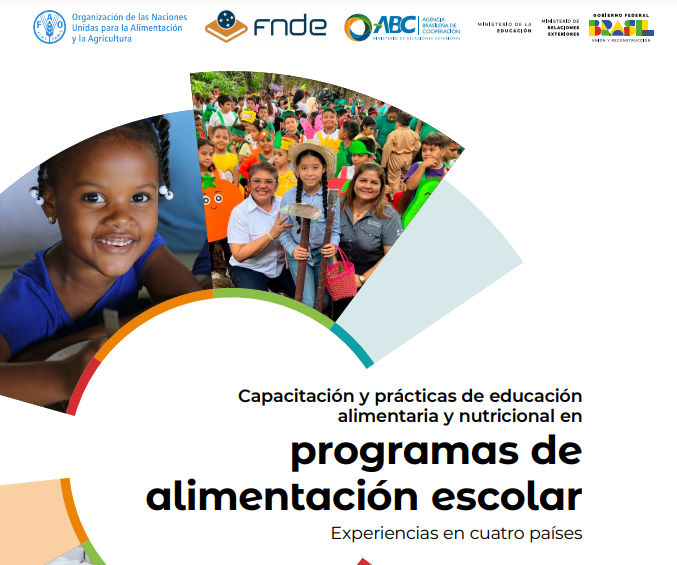The document is aimed at professionals from school feeding programs and is an initiative of the Brazil-FAO International Cooperation in school feeding and FAO Campus.
Paulo Beraldo
Brasília, Brazil, May 7, 2024 – Conducted in 2019, the course in food and nutritional education (FNE) strengthened the capacities of 167 professionals for the development of food and nutritional education actions adapted to the specific contexts of each national school feeding programme. With the aim of identifying the effects of the course, based on the learnings acquired in this training, the Brazil-FAO International Cooperation in school feeding and FAO Campus launched a study that gathers experiences from four countries: El Salvador, Honduras, Peru, and the Dominican Republic.
The publication “Training and Practices of Food and Nutritional Education in School Feeding Programs: Experiences in Four Countries” compiles data and testimonies from participants, course tutors, and other stakeholders. The content is only available in Spanish.

The course was carried out in the second semester of 2019 within the framework of cooperation between the Government of Brazil, through the Brazilian Cooperation Agency (ABC) and the National Fund for Education Development (FNDE), and the Food and Agriculture Organization of the United Nations (FAO), with the objective of raising awareness about the importance of school feeding programmes and training the professionals to develop actions of FNE adapted to the specific contexts of each programme.
The study was published by the project Regional Agenda for Sustainable School Feeding for Latin America and the Caribbean, jointly executed by ABC, FNDE, and FAO. The content was produced with the collaboration of FAO Campus, which supported the development of the study and the training.
The document, which evaluated the results of this experience, brought important findings such as the fact that field internships had a direct effect on improving the school food environment and showed that the implementation of FNE interventions impacted not only the participants but also various institutions and stakeholders, generating multiplier effects.
It was also confirmed that the course contributed to understanding and training on the importance of school feeding programmes to promote food and nutritional security and the Sustainable Development Goals (SDGs). Additionally, it promoted professional valorization of participants, as many became course tutors and project coordinators in their countries.
“Another finding not only from the document but from the cooperative work in school feeding carried out since 2009 by the Brazil-FAO Cooperation is the confirmation that the training of these actors is an important element to ensure the quality and sustainability of programmes, especially in cases of changes in government administrations,” said Najla Veloso, coordinator of the project Regional Agenda for Sustainable School Feeding for Latin America and the Caribbean.
“Many of the effects found in this study may and should have been a result of the sum of the many actions and activities developed since 2009, including the course and other activities developed by governments themselves as part of the process of strengthening their school feeding policies and programmes,” she expressed.
Karina Crespo, coordinator of FAO Campus, also added that the achievements in food and nutritional education in these countries are not only a result of this course but of a set of activities and strategic actions implemented in the framework of the development of their national policies.
She also commented that the course was a unique opportunity to drive transformation processes considering “the change of practices at an individual level, the adoption of improvements at the institutional level, and the generation of conducive environments, allowing progress from these practices towards the development of public policies, the generation of regulations, and the sensitization of other important actors, such as families, providers of family agriculture, and local authorities, among others.”




